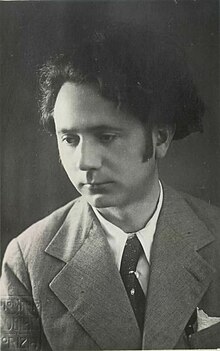Lojze Bratuž
Lojze Bratuž or Italian Luigi Bertossi (born February 17, 1902 in Gorizia ; † February 16, 1937 there ) was a Slovenian choirmaster and composer.
Life
Bratuž was born into a Slovene-speaking family in Gorizia. At that time Gorizia was the center of the Austrian crown land, Grafschaft Görz and Gradisca . Due to the bilingual population is Gorizia today, after the division in 1946, in Italian Gorizia and Slovene Gorica . Bratuž became a music teacher after attending the Slovenian-speaking school. He was married to Ljubka Šorli. The only son is a writer and representative of the Slovenian minority in the Friuli-Venezia Giulia region.
The Austrian crown land of Gorizia and Gradisca became Italian after the Peace of St. Germain on September 10, 1919, after the area had been occupied by troops of the Kingdom of Italy at the end of the First World War . In the years that followed, the Slovenian population was under increasing pressure from Italianization. During this time Bratuž worked as a music teacher in the country and later in Gorizia. The city's archbishop appointed him coordinator for the Slovene-speaking choirs in his diocese in 1930, although Bratuž was briefly imprisoned in 1929 because of his position on the language issue.
Death and aftermath
On December 27, 1936, after a mass in what is now Gorica Podgora, during which he led a choir, Bratuž was kidnapped, abused and forced to choke down a mixture of castor oil , gasoline and machine oil by fascist squadristi . Bratuž never recovered from this abuse. He died on February 16, 1937 in Gorizia Central Hospital. A few days before his death, his friends had stood under his room window in the hospital and played a Slovenian song. They dispersed very quickly afterwards, fearing arrest.
Some of Bratuž's musical paraphrases of various songs and his movements for choral singing are still known today. A mixed choir and the Slovenian Cultural Center in Gorizia now bear his name.
literature
- Foibe : Nationalism, Revenge and Ideology in Venezia Giulia and Istria in Journal of Contemporary History, Volume 44, Issue 4, Pages 657-674, 2009, ISSN 0022-0094 .
| personal data | |
|---|---|
| SURNAME | Bratuž, Lojze |
| ALTERNATIVE NAMES | Bertossi, Luigi |
| BRIEF DESCRIPTION | Italian choirmaster and composer of the Slovene language |
| DATE OF BIRTH | February 17, 1902 |
| PLACE OF BIRTH | Gorizia |
| DATE OF DEATH | February 16, 1937 |
| Place of death | Gorizia |
